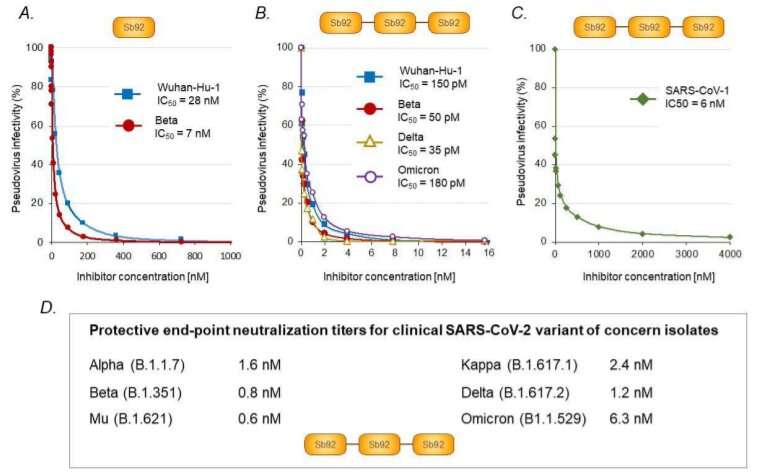A 'biological mask' administered with a nasal spray can protect against coronavirus infection for hours

Cell cultures and animal studies show that TriSb92, a new molecule developed by the researchers, protects against coronavirus infection for at least eight hours even in cases of high exposure risk. In contrast to vaccine protection, the effect of TriSb92 begins immediately after its administration.
"In animal models, nasally administered TriSb92 offered protection against infection in an exposure situation where all unprotected mice were infected," says Postdoctoral Researcher Anna Mäkelä, the first author of the study.
The findings have been published in an as of yet non-refereed report.
Targeting the Achilles heel of the coronavirus
The TriSb92 molecule is based on an entirely new technical solution developed in Finland for targeting biological drugs. In the study carried out at the University of Helsinki, this solution was utilized to inhibit the functioning of the spike protein on the surface of the SARS-CoV-2 virus.
"Targeting this inhibitory effect of the TriSb92 molecule to a site of the coronavirus spike protein common to all variants of the virus makes it possible to effectively inhibit the ability of all known variants, Omicron included, to infect people," Mäkelä says.
In model virus studies, TriSb92 was able to prevent even the spread of SARS, the virus that threatened us in the early 2000s.
"In other words, we can fairly confidently assume that future variants of SARS-CoV-2 and perhaps even entirely new coronaviruses that may threaten to cause pandemics are susceptible to it," Mäkelä confirms.
The product, which is nasally administered, could in the future serve as a kind of biological protection against coronavirus infection that is sprayed on the mucous membranes.
Vaccines still needed
Mäkelä works in Professor Kalle Saksela's laboratory at the University of Helsinki. Saksela is involved in the development of a Finnish nasally administered coronavirus vaccine, which is expected to progress to clinical trials in the spring. Mäkelä and Saksela emphasize that, instead of competing with them, TriSb92 is a solution that supplements vaccines.
"These types of molecules that prevent infections, or antiviral drugs for that matter, cannot substitute for vaccines in protecting the population against the coronavirus disease," Saksela says.
However, there is a great need for novel means with which to enhance the protection provided by vaccines.
"Individuals whose immune system does not respond strongly enough to vaccines spring to mind in particular. Having said that, we know that new variants, especially Omicron, are capable of circumventing even effective vaccine responses worryingly well. Taken before any kind of social interaction, TriSb92 could be useful to people whose vaccine protection is insufficient for one reason or another. Depending on the epidemic situation, it could also benefit fully vaccinated individuals when administered before any situation associated with a high risk of exposure," Saksela says.
More information: Anna R. Mäkelä et al, Intranasal inhibitor blocks omicron and other variants of SARS-CoV-2, (2021). DOI: 10.21203/rs.3.rs-1196079/v1




















